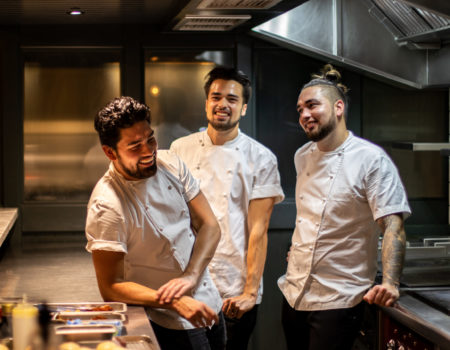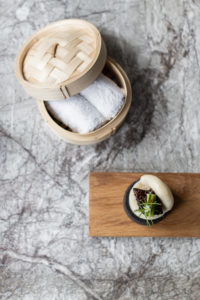Classic skills, international flavours
When it comes to a cooking career, the world’s flavours are there for the taking, providing inspiration and creativity, new ingredients and techniques to try, all of which will help your own style blossom. So why bother learning the classics at the start?
“The classics are like the laying the foundations of a house, you need them to build upon. You need to put the groundwork in,” says Luke Selby (winner 2017), who started his career at Le Manoir Aux Quat’Saisons, learning all the classics from Raymond Blanc and Gary Jones. This led to him later entering and winning the Roux Scholarship, for which he was the first scholar to stage in Japan. “The Roux Scholarship gave me the chance to turn it all on its head and to see the style and way the cook in Japan, which was completely different.” At his London restaurant Evelyn’s Table, Luke and his brothers Nathaniel and Theo (pictured below), bring together techniques from both the classic (for example, meat is roasted on the bone) and the Japanese: “I always start the menu with something raw, like they do in Japan, such as the scallop sashimi on the current menu. We open the shell in front of the guest and the scallop is still quivering,” says Luke. “And we recently found a trout supplier who uses the ikejime method, which keeps the flesh firm. Then we cure it with salt and sugar and use Italian bergamot and fruity French olive oil. It’s like an homage to the style of cuisine we do, using the freshness and locality of British produce with influences from Japan.” [main picture]
Roux Scholarship 2010 winner Kenneth Culhane, who runs The Dysart Petersham, first learned about food growing up on a rural farm in Ireland but his time working in Australia and his Roux Scholarship stage at Jean Georges in New York first introduced him to the idea of combining the classics with other country’s cuisines: “Working with Tetsuya Wakuda with his Japanese and classical French-inspired cookery, and with Jean-Georges Vongerichten really helped me further develop my cookery, combining both cultures with taste, refinement and balance.” Later, Kenneth’s cuisine began to embrace the flavours from Mauritius and Asia introduced to him by his wife’s family. “My wife’s family in Mauritius have a strong heritage in Chinese and Indian cultures which are a constant inspiration in my cookery,” he says. “The classics are fundamental to cookery. By combining Asian cultures or traditions with the balance and finesse of the classics creates a complexity to the overall experiences we can share with each other.”
Richard Stuart, who won the Roux Scholarship in 1987, has worked all over the world, most recently spending more than a decade at Galaxy Entertainment in Macau, China, where knowing the classics is important for the chefs he is training and working in his brigades. “Without these classic basic skills and knowledge, it just would not be possible to orchestrate and move forward as a unit. We rely on those classic skills and knowledge to help us execute the exceptional ingredients we have to work with each day.” Among those ingredients is asparagus lettuce, or celtuce, which is used widely in Chinese cuisine. “It’s slowly beginning to find its way on wester. menus particularly Michelin restaurants. I would say it has the texture of kohlrabi and a slight bitterness. Here I use my western skills to shape the celtuce and cut into a paysanne, blanch and then lightly stew in a beurre fondue (an emulsion of butter and vegetable stock). I created a dish using this vegetable for private set dinner menus with Stone Salmon Bass, Gillardeau Oyster, Celtuce and Amur River Schrenckii Caviar which has become a popular request for repeating guests.”
How are you combining classic skills and international flavours? Post a picture of your dish on instagram and tag @roux_scholarship
Photos of Luke, Theo and Nathaniel and food from Evelyn’s Table (including home page) by Georgia Rudd.

